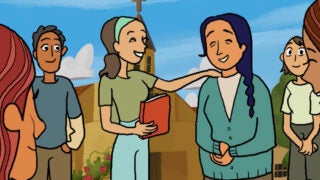For many scientists, it’s no longer a question of “if” but “when.” What will happen when we finally come face to face with space aliens? USC experts look to the skies for answers.
Linguistics
News Listing
Every two weeks, a language dies. Lina Brixey, a member of the Choctaw Nation and a USC Viterbi doctoral candidate, is determined hers will not be next.
Language changes as culture changes, and in the 2010s pronouns were the words on center stage. A doctoral student in linguistics at USC Dornsife examines how that came to be.
Experts estimate that a language goes extinct every two weeks. USC student Prim Phoolsombat wants to use a blend of linguistics and computer science to help save them.
Half the world’s languages could disappear in a few decades, and USC Dornsife’s Tok Thompson is helping students figure out why — and what might be lost.
The USC Distinguished Professor’s work in linguistics changed fundamental aspects of the way we think about the meaning of language.





